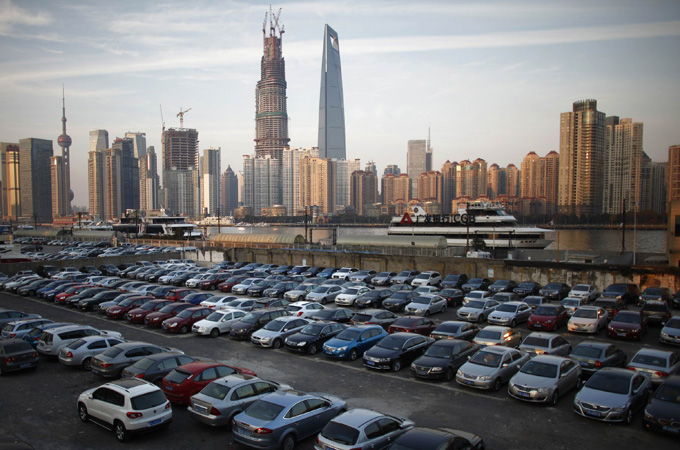A sad malo globalne stvari, ne bih bio ovako pametan da ne postavim ![]()
The Fall and Rise of the West
Why America and Europe Will Emerge Stronger From the Financial Crisis
By Roger C. Altman
January/February 2013
The 2008 financial crisis and the Great Recession that followed have had devastating effects on the U.S. economy and millions of American lives. But the U.S. economy will emerge from its trauma stronger and widely restructured. Europe should eventually experience a similar strengthening, although its future is less certain and its recovery will take longer to develop. The United States is much further along because its financial crisis struck three years before Europe's, in 2008, causing headwinds that have pressured it ever since. It will take another two to three years for these to subside, but after that, U.S. economic growth should outperform expectations. In contrast, Europe is still in the midst of its financial crisis. If historical logic prevails there, it will take four to six years for strong European growth to materialize.
Such strengthening in both regions will occur for one major reason: the crisis years have triggered wide economic restructuring. Sweeping changes in government finances, banking systems, and manufacturing are under way, as are structural reforms in labor markets. All this is proving once again that global capital markets, the most powerful economic force on earth, can effect changes beyond the capacity of normal political processes. And in this case, they can refute all the forecasts of Western economic decline. Indeed, in the years ahead, the United States and Europe could once again become locomotives for global economic growth.
This is not to say that the crises were worth the pain; they most definitely were not. There is palpable suffering on both sides of the Atlantic due to unemployment and government austerity measures. It is tragic that so many people have lost their jobs and will never recover them. And it is socially corrosive that the crises have accentuated existing trends toward greater income inequality. But these events happened, and the subject being addressed here is their long-term impact.
The U.S. economy has been expanding -- albeit in fits and starts -- since the recession's trough, in June 2009. Europe, however, is on an entirely different timetable. Unlike those in the United States, Europe's financial systems did not implode in 2008. There were severe problems in Ireland and the United Kingdom, but capital markets did not revolt against Europe as a whole, and thus there was not a large fiscal or monetary response. It was not until 2012, when the sovereign debt and banking crises hit the continent in full force, that the eurozone confronted problems comparable to those that had afflicted the U.S. economy in 2008–9. As of today, therefore, the eurozone's GDP is still shrinking, and its recession may not have bottomed out yet. Having experienced its crisis first, the United States now faces a shorter path to recovery. Yet if European countries can restructure their economies to the degree that the United States has, there will be cause for optimism.
The economists Carmen Reinhart and Kenneth Rogoff have argued that periods of economic recovery after financial crises are slower, longer, and more turbulent than those following recessions induced by the business cycle. The painfully slow recovery in the United States and the sharp economic stress in Europe corroborate this thesis. But history is filled with examples of countries whose economies grew stronger after financial implosions. Following the Asian financial crisis of 1997–98, South Korea accepted a tough bailout package from the International Monetary Fund, strengthened its financial system, and increased the flexibility of its labor markets; soon thereafter, it enjoyed an economic boom. In Mexico, the economy has performed well ever since the collapse of the peso and the U.S. rescue package of 1994. A similar phenomenon occurred in parts of Latin America following the sovereign debt crises there in the late 1980s. Although these financial crises were far smaller than the 2008 collapse in the United States, they followed the same pattern, with capital markets rejecting the old order -- and then inducing major economic restructuring.
RESTRUCTURING AMERICA
Why will the recent crises eventually strengthen the U.S. and European economies? In the United States, a resurgent housing sector, a revolution in energy production, a remodeled banking system, and a more efficient manufacturing industry will fuel a boom. Meanwhile, the reelection of President Barack Obama and the looming "fiscal cliff" have increased the prospects of a grand bargain on deficit reduction and a solution to the country's debt problem.
First, after suffering a catastrophic collapse, the U.S. housing market is now poised for major, multiyear growth. Historically, when the U.S. housing sector has been pushed down far enough for long enough periods of time, it has eventually rebounded to very high levels. Before the recent crisis, the housing bubble had inflated so much that when it finally burst, the sector truly collapsed. Between 2000 and 2004, an average of 1.4 million single-family homes were built per year, but that number declined to 500,000 after the crisis and remained there until recently. Sales of new homes, which averaged 900,000 per year during the bubble, fell by two-thirds after the bubble popped. And overall residential investment, which accounted for four percent of U.S. GDP from 1980 to 2005, has averaged only 2.5 percent since 2008.
Although the housing collapse meant disaster for millions of homeowners who could not service their mortgages, it also cleared out the abuses and excesses that had plagued the sector for years. As a result, U.S. banks have spent the last few years improving their mortgage-underwriting standards and securitization markets, and household attitudes toward mortgages and home-equity financing have become healthier. Now, the housing sector has finally turned a corner, with a key home price index -- the S&P/Case-Shiller 20-city composite -- rising by eight percent since March 2012. The levels of relevant supply have fallen sharply (in other words, fewer homes are for sale), mortgage credit is more readily available, and population growth, coupled with a recovery in household-formation rates, is likely to drive high demand -- all of which means that house prices are bound to keep growing. These factors are likely to boost total residential investment, which includes new construction and home remodeling, by 15–20 percent over the next five years. This change alone could add one percentage point to annual U.S. GDP growth and as many as four million new jobs to the economy.
Second, new technologies are producing a spectacular turnaround in U.S. oil and gas production. Advanced seismic techniques and innovative approaches to hydraulic fracturing and horizontal drilling have opened energy deposits that were previously unknown or inaccessible. The result has been a dramatic recovery of both the natural gas and the oil industries. In 2012, U.S. natural gas output reached 65 billion cubic feet per day, which is 25 percent higher than it was five years ago and an all-time record. Shale gas accounted for much of this increase. Meanwhile, U.S. oil output has soared. It is estimated that in 2012 alone, the production of oil and other liquid hydrocarbons, such as biofuels, rose by seven percent, to 10.9 million barrels per day. This marks the largest single-year increase since 1951.
Moving forward, the U.S. Department of Energy forecasts that American liquid hydrocarbon production will rise another 500,000 barrels in 2013, and the International Energy Agency projects that the United States will surpass Saudi Arabia as the world's largest oil producer by about 2017. Overall, this energy boom could add three percent to U.S. GDP over the next decade, in addition to as many as three million direct and indirect jobs, almost all of which will pay high wages. The United States could cut its oil imports by one-third, improving its balance-of-payments deficit. Also, the higher natural gas output will reduce the average consumer's utility bill by almost $1,000 per year, representing a further stimulus to the U.S. economy. And the American public's hunger for economic recovery and jobs has softened opposition to this energy revolution.
Third, negative publicity aside, the U.S. banking system has been recapitalized and thoroughly restructured since 2008. No one could have reasonably imagined the speed of the improvements in banks' capital and liquidity ratios that have occurred since then. The largest banks have consistently passed the rigorous stress tests administered by the U.S. Federal Reserve, and, surprisingly, they are well ahead of schedule in meeting their required capital ratios under the Basel III international regulatory framework. Midsize banks are in even better shape. Although the job is not yet finished, these institutions have rapidly rid themselves of their troubled legacy assets, especially mortgage-backed securities. Both large and midsize banks have divested from broad swaths of assets and raised substantial new capital from public and private sources. In many cases, moreover, they have revamped their management teams and boards of directors. In light of these changes, the earlier, acute concerns about the financial stability of U.S. banks have largely dissipated.
In fact, banks are already lending aggressively again to both businesses and consumers. According to the Federal Reserve, outstanding loans to U.S. businesses now total $1.45 trillion, having increased at double-digit rates for each of the past four quarters. This number is still below the 2008 peak, but the gap is closing quickly. In terms of consumer credit, the previous record high was surpassed in 2011, and the total rose by another three to four percent in 2012. All this credit is boosting GDP growth, and the banking sector is likely to expand its loan totals consistently over the next few years.
Fourth, the Great Recession has quietly spurred greater efficiencies in the U.S. manufacturing sector. Unit production costs are down by 11 percent in the United States compared with ten years ago, even as they continue to rise in many other industrialized countries. And the differences between U.S. and Chinese labor costs are narrowing. The U.S. economy has added half a million new manufacturing jobs since 2010, and this growth should persist for a number of years. The transformation of the U.S. manufacturing sector is perhaps best reflected in the auto industry. In 2005, U.S. automakers' hourly labor costs were 40 percent higher than those of foreign producers that operate plants in the United States. But today, these costs are virtually identical, and the Big Three -- Chrysler, Ford, and General Motors -- have regained market share in North America.
The resurgence of the housing and energy sectors will also positively affect the manufacturing industry. Given that the outlook for residential construction is so strong -- and considering that new homes contain so many manufactured products -- further manufacturing job growth is a near certainty. Moreover, decreasing natural gas prices will aid the petrochemical sector and all types of manufacturing that use this fuel.
Finally, although there are no guarantees, the chances that Washington will fix the national debt problem have increased. With Obama citing deficit reduction as the foremost goal of his second term -- and with election results that were unfavorable to Republicans, whose anti-tax position now lacks public sanction -- the prospects for a decisive deficit-reduction agreement have improved. If this occurs in 2013, it will provide a further boost to business and investor confidence, as well as to overall private investment.
HOPE FOR EUROPE
In Europe, there is less evidence, so far, that economies will emerge stronger from the crisis years. This is largely because after a sharp dip in 2008, Europe was recovering until the eurozone's twin sovereign debt and banking crises struck in 2011. Furthermore, compared with that of the United States, the amount of economic restructuring required in Europe is deeper and harder to achieve. In part, this reflects the sheer complexity of the European Union, which is composed of 27 very different countries. It is also an outgrowth of the inherently inflexible, sclerotic nature of many European economies. Therefore, the consequences of the European crisis and the question of whether it will truly lead to wide-scale restructuring remain unclear. Nevertheless, it is logical that large and positive changes could emerge, and a few encouraging signs are already visible. The eurozone has been fitfully moving toward fiscal union and banking reform. Across the EU, economies are boosting their productivity and making their exports more competitive, and governments are reining in their public sectors.
There are also precedents within Europe of restructuring and strengthening after major financial crises, such as Sweden's experience in the 1990s. In that case, a credit and real estate boom coincided with a long period of public-sector expansion and a debt-to-GDP ratio of around 80 percent. Sweden, at the time, was widely considered the model of the European welfare state. In 1992, however, its banking system collapsed and unemployment rose to 12 percent, triggering wide-ranging economic, fiscal, and banking reform. Stockholm raised taxes, deregulated the electricity and telecommunications sectors, and slashed federal spending, including on pensions and unemployment benefits. All these steps improved Swedish competitiveness and boosted GDP growth, which rebounded to four percent two years later, in 1994.
In the eurozone today, governments are making tentative progress. Consider, for a start, the fiscal side, where there has been movement toward instituting a central fiscal authority with meaningful control over budgets and debt on a country-by-country basis. The eurozone members will probably not accord the eventual fiscal union with the legal authority to completely reject national budgets. Still, if it has credibility in financial markets, the fiscal union will possess real power, because its expressions of disapproval could induce punitive reactions from those markets.
Second, the eurozone's decision to give the European Central Bank supervision over the continent's largest private banks is also a major step forward. As a result of this move, these banks will finally be regulated in a modern, transparent, and independent fashion -- a far cry from the present situation, in which weak local overseers coddle the banks. It also moves the European Central Bank closer to the more powerful and flexible model of the U.S. Federal Reserve. This is an essential change.
To fully repair its banking system, the eurozone needs an entity similar to the United States' Troubled Asset Relief Program, known as TARP, and the recapitalization of Spain's banks is a first step in that direction. The EU's bailout fund, the European Stability Mechanism, is providing Spanish banks with capital conditional on an overall cleanup of their balance sheets. If this approach were adopted throughout Europe, it would ultimately produce a healthier financial system.
Third, some countries in Europe are in the process of improving their structural productivity problems, which were a major, albeit less widely noted, contributor to the crisis. It looks increasingly possible that the least competitive European economies, mainly located along the continent's southern periphery, will make substantial improvements in productivity. Without local currencies to depreciate, these countries have been cutting costs through internal devaluations, which involve cutting labor inputs. In Greece, Portugal, and Spain -- the eurozone countries under the most financial pressure -- unit labor costs have fallen significantly since 2010. These countries have also initiated crucial labor-market reforms, such as curbing minimum-wage requirements and eliminating restrictions on hiring, firing, and severance. Ireland's path is instructive. After the Irish banking system collapsed in 2008, Dublin cut manufacturing costs sharply and boosted productivity. Today, just a few years removed from its crisis, Ireland is again one of the most efficient places in Europe for production.
Fourth, exports in the peripheral countries -- which have long labored under large trade deficits with Germany and other northern European states -- are regaining their competitiveness. As a result, Italy, Portugal, and Spain now enjoy reduced deficits in both trade and their current accounts, reflecting the lower costs of their exports and a weaker euro. In Greece, despite the severity of that country's economic fall, the absolute level of exports has returned to pre-crisis levels.
Finally, by beginning to trim their public sectors, eurozone governments are playing an important role in the continent's economic renewal, as these spending cuts will create more room for the private sector to grow. According to the European Commission, the collective deficit of the 17 members of the eurozone fell to 4.1 percent of GDP in 2011, a significant decrease from the 6.2 percent figure in 2010. Moreover, the broader EU saw its collective deficit cut by one-third in 2011. To be sure, many of the European countries' deficit-to-GDP ratios remain well above the official target of three percent, and debt actually grew faster than GDP in the eurozone as a whole last year. Still, pressure from financial markets should continue to shrink European public sectors into the future.
Throughout modern history, severe financial crises have caused great pain to vulnerable segments of affected societies, but they have also often strengthened underlying economies. Both of these countervailing phenomena are asserting themselves in the United States today. Europe is inherently more fragile, but initial evidence suggests that the same dynamic is occurring there. If this historical pattern holds true, the United States and Europe could defy conventional wisdom and again lead growth in the world economy.
http://www.foreignaf...ise-of-the-west
![]()
Edited by JimmyM, 16 January 2013 - 15:08.











